|
Jungle Karma
How a Blind Musician in Cambodia Taught Me to See
Article and photos by James Michael Dorsey
|
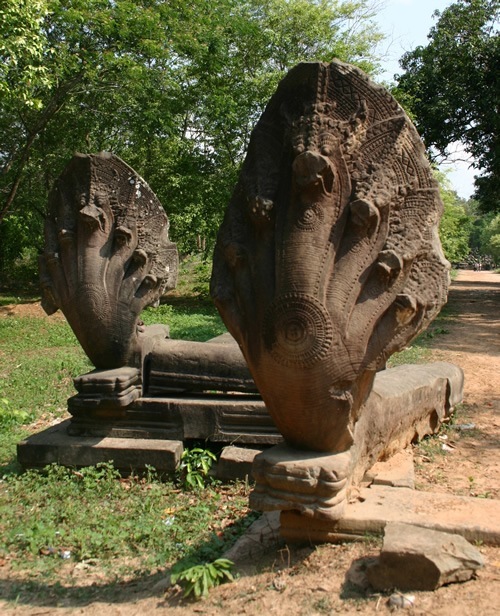
|
|
Naga temple guardians in Cambodia.
|
Monarch Butterflies covered me on the stone path through the mine fields of Beng Melea, drawing me to the music.
The irony of the temples of Cambodia is that their history of death and destruction has always been balanced by high art, mysticism, and music. In this land that values suppression of the ego, the poorest clad beggar may be a holy man or even a saint.
|
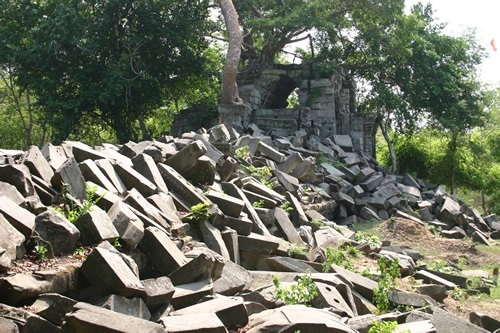
|
|
Fallen temple stones.
|
Walking past the leering death's heads, the gauzy yellow haze of sunrise, filtered through wood fire smoke, turned thousands of spider webs heavy with dew into shimmering prisms; these in turn snared the regal moths in mid-flight, turning their dance into a death struggle and an instant reminder of Buddhist karma. I stood mesmerized, watching fierce black spiders the size of my fist scurry across their webs like high wire walkers to enshroud their victims and inject them with lethal venom. The cycle of life.
That day it was not the impromptu musical bands of landmine victims that can always be found in the jungle, but a single musician whose soaring melodies transcended the repetitive notes of Southeast Asian music and caused the monarchs to dance.
He sat alone, cross legged in the alcove of a decaying temple in a freshly ironed shirt, his sightless eyes wandering left and right while his fingers ran up and down the fret board of his thro like a bug on hot tin. The thro is a traditional instrument resembling a violin but with only two strings, and in the jungle they may be made from an old tin can and a tree branch, but this gentleman’s was of high quality.
|
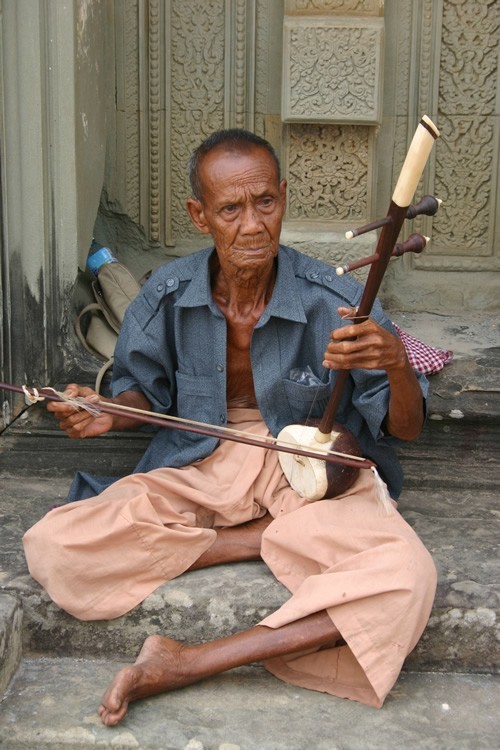
|
|
Qok playing his thro.
|
I approached silently so as not to interrupt his playing and only then noticed the tiny scars behind his eyes where the shrapnel had entered his head and cast him into perpetual darkness.
In modern Cambodia, one out of six people is a land mine victim, and I have not met anyone without a tale to tell. My own guide, Sokkhouen, had visited this very spot with his family for a picnic one month prior to my arrival. Sitting on something hard, he stood up to discover an anti-tank mine. He simply did not weigh enough to detonate it. Such is life in Cambodia.
|
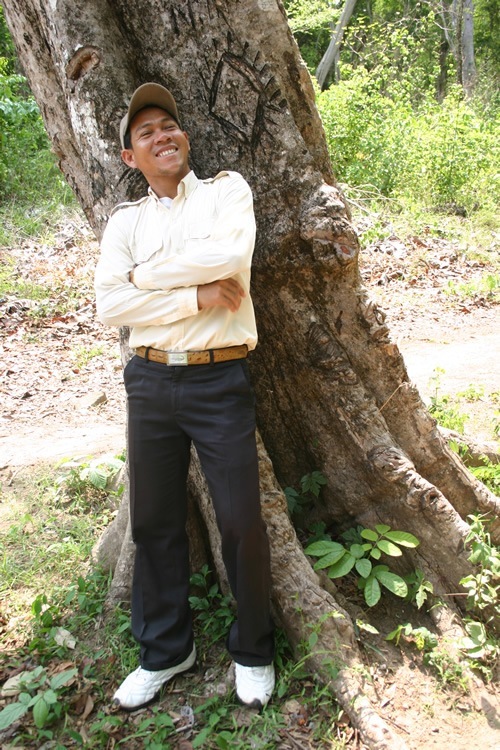
|
|
My guide, Sokhouen, standing on tank mine spot.
|
The musician stopped playing abruptly, looking up at my ungainly western footfalls and inquired, “American?” Caught off guard by his educated guess I muttered a quiet “yes” followed by “How did you know?” “You smell of meat,” he said softly, then laughed and continued to play.
I sat down next to him, surrounded by the last remnants of a once great civilization, alone with the history as his music reverberated off the hand-carved stone walls. The Khmer are historically a musical people whose less fortunate have preferred to make music in exchange for visitor’s coins, rather than begging. But this man was something different.
His name was Qok and he was happy to share his story. Born in Battambang, he was classically trained on the violin as a child in Beijing, and later in Hanoi, before returning to Phnom Penh to join an orchestra. He claimed to have been a prodigy before joining the mass exodus from cities to rural life imposed by the Khmer Rouge. It was on that march that a mine took his sight but not his soul.
|
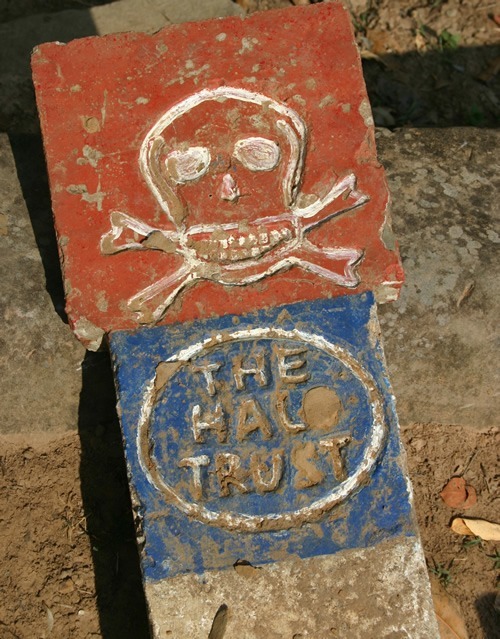
|
|
One of many land mine warning signs in Cambodia.
|
Considered useless by the authoritarian regime, he was taken in by a kindly Oma (an older lady, usually a grandmother) who kept him out of sight so as not to attract attention, and so survived the dark years by being invisible. With no instrument to play during that time he retreated into his own mind where the music never stopped.
Years later, after the shadow had left the land, he found his family through a United Nations agency and began to play again, the instinctive knowledge still imbedded in his fingers. He offered me snippets into his life, then would stop and play a few bars, narrating a tale of terror with soaring musical beauty, at one with his instrument, coming and going from a better place while drawing me in. At night he now plays in a club in the city, but during the day he plays for himself in the temples of his ancestors.
His smiling face now radiated peace, and he claimed his blindness to be a gift that shut out all distractions and allowed him to concentrate on the music that for him is a living prayer. It had obviously taken him to a place that few ever achieve.
As the sun rose higher he invited me to his hut for tea, following a sure path in his mind’s eye past the mocking death's heads that dot the temple grounds like so many mushrooms. Inside I sat on his cot in front of a tiny Buddha on a plain table, and he handed me his thro as his fingers prepared our refreshments with the same sureness they walked across the frets of his instrument. The body of the thro was hand-carved from a coconut, and finely etched with intricate designs. The face was stretched tight with buffalo hide, and the neck hewn from a fine dark hardwood. His grandfather had made it, and his father had learned to play on it — the product of a fine craftsman. Though he was sightless, I felt he was watching me.
I handed the thro back to sip my tea, and he resumed his melody with his body swaying like a cobra. In between bars he asked the usual questions of a visitor, but suddenly stopped playing and asked, “Why are you here?”. Again his directness unarmed me. Did he mean why had I visited the temple or why was I sitting in his hut? I felt some obscure connection to him and wanted to say my entire life is a search for something I cannot define. but how do you tell that to a stranger making music in a mine field? Words just failed me.
Apparently my silence was a sufficient response. He rose and again handed me the thro, saying that it now belonged to me. I began to respectfully protest by saying that I was not a musician and could not accept such a gift. But he cut me off short, with his vacant eyes now locked onto mine.
Suddenly it occurred to me that the thro is but a vehicle, a reminder of possibilities, and the music comes from elsewhere, much like a Christian votive candle carries a prayer to the Almighty. Then I caught myself. Was my imagination running wild or was a holy man communicating with me on a level beyond my comprehension? I felt my soul was laid bare before Qok and he was guiding me to possible answers.
Qok slowly reached behind his cot and produced another thro even finer than the first. I wondered how many he possessed and accepted his gift with a thank you. He stood up, and together we wordlessly walked back to his spot in the temple where he sat to play. I felt dismissed, but not in a bad way. As I walked away listening to his music until the jungle silenced it, I hugged my gift that now had a single monarch riding on its strings.
Today that thro hangs on my wall and it has taught me many lessons — perspectives on life I would never contemplate without a daily reminder before my eyes. The thro has been my vehicle to deeper thought, if not comprehension.
I am still not sure what happened that day in the jungle, and my life continues to be a search, but I know now that the truly important questions have no logical answer.
It is the journey that is most important.
James Michael Dorsey is an explorer, award winning author, photographer, and lecturer. He has traveled extensively in 45 countries, mostly far off the beaten path. His main pursuit is visiting remote tribal cultures in Asia and Africa.
|
